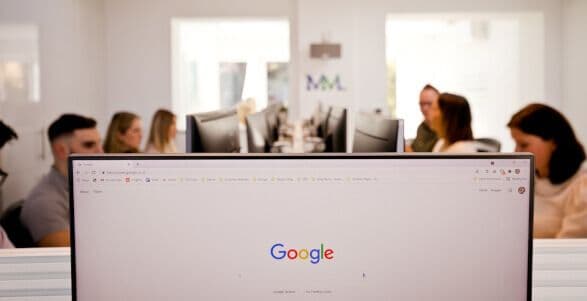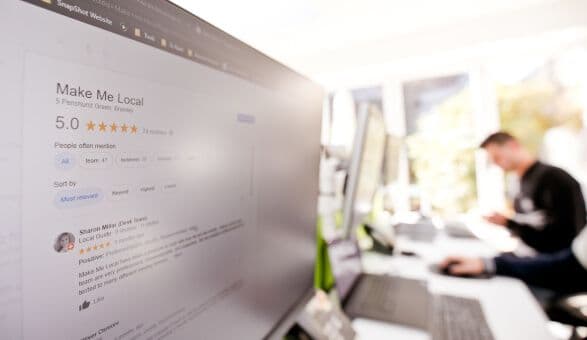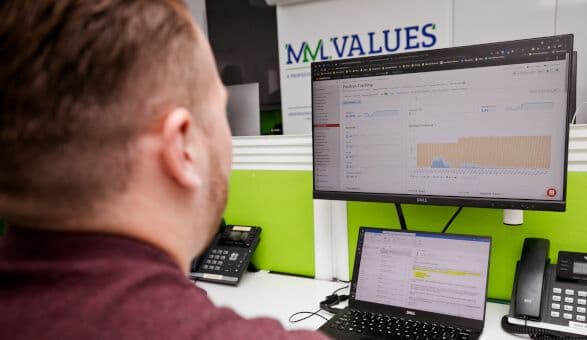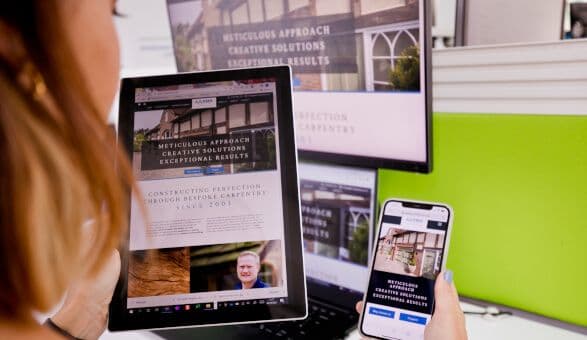
A lot of companies make Google seem way more complicated than it is. Google is just a place where you go to find the answers to your questions. That’s all it is.
People think of Google as this complex, algorithmic machine but it’s just tool you use to answer questions. Google presents you with the answers to your questions and it’s extremely protective over the information it gives.
This is because if you searched for‘plumber in Bromley’ and received results for‘electricians in Bromley’ you would very quickly get fed up and would lose confidence in Google. Then, you’d probably move on touse other search engines like Bing.
The thing is – Google really is the king of search engines. When you go to Bing, their biggest search enquiry is actually Google! This must drive Bill Gates mad because even though all Windows products use Bing as their default search engine, people only seem to care about switching over to Google. We’re all just conditioned to think like that. 4 in 10 people will go to Bing but 9 in 10 will go to Google first. This means that Google has to be extremely protective over the information it provides if it wants to stay ahead.
How does Google work?
When you search Google, you’re not actually searching the live internet. You’re searching a version of the internet that Google has stored on its servers. Our website is stored on our server in London and every single page is a little bit of code sat on that server. When Google needs to show a result from the Make Me Local website, it doesn’t search our server – this would be really inefficient. Instead, it searches its own servers for the pages it has already stored.
Google uses bots called ‘spiders’ to crawl throughout the internet and follow the links between webpages – this is why links are so important for websites. If a spider reaches a website with no links, there’s nowhere for it to go and it hits a dead end. Google constantly wants its spiders to move around to find fresh content. This means that linking between related pages on a website or making sure that there are clear links to reference points such as blogs and case studies is so important. For the people using a website, they can find the information they need. For Google, their spiders can find all the content and bring it back to Google’s servers to be indexed and stored.
Fun fact – a spider doesn’t see a webpage the same way that we do, they see all the code behind it. If you want to see what a spider sees on a webpage all you need to do is right click>view>page source.
On Google’s servers, content is organised and filed away so that it can be retrieved when a search enquiry is received. Think of Google as a great big filing cabinet. The spiders go out and find the individual webpages, then these are filed in the cabinet under the relevant keywords. For a keyword like ‘plumber in Bromley’ that section of the filing cabinet will contain 284,000 webpages (not websites)! However, if you searched for ‘plumber in London’ you’d find that Google has indexed 14.4 million webpages. Local searches are more focused than regional ones.

How does Google display results?
On a Google results page, the information is laid out in a specific order. Ads are listedfirst, then map listings, and finally the organic results that are taken from Google’s index of webpages.

Ads on Google work on a pay-per-click basis, meaning that you need to pay Google money every time someone clicks on your listing.

Maps are typically based on the proximity and relevance of the businesses. If someone is searching for plumbers in Bromley, Google wants to show them businesses that are based in Bromley, have good reviews, and cover the right area. By doing this, they provide the best possible user experience and ensure that people will be happy to continue using their services.

When it comes to organic results, this is where things get seriously competitive. To be on the first page of Google you have to be in the first 10 results. That means that if your page is targeting ‘plumber in Bromley’ you need to be in the top 10 pages out of the 284,000 stored in Google’s index!
Performing well on Google
If you don’t appear on the first page, you’re not going to receive much traffic. People just don’t click onto the second page. They say there’s no place to hide on the internet, but the second page of Google is a pretty good option! If someone doesn’t find what they’re looking for on the first page, they will typically refine their enquiry instead. So, if ‘plumber in Bromley’ doesn’t work, ‘24-hour plumber in Bromley’ might be their next choice. The trick to performing well on Google is to make sure that when the search engine is looking for results to display on the first page your webpage is the most relevant to that enquiry.
On page SEO – setting yourself apart
Content is key. The content on a page should make Google go “wow”. It needs to be relevant for the enquiry and it needs to be informative. That doesn’t mean using the phrase ‘plumber in Bromley’ over and over again – it means discussing the topic and demonstrating your expertise. Google needs to know that if it sends people to your page they will find what they need.
The way the content is structured also plays a vital role in a page’s performance. There are technical elements like the page title (the title you would see on a Google results page) and the main heading which summarises the topic covered on rest of the page. All the other headings are related to that, reinforcing the signals from the content and leaving no doubt that the page is a reputable source of information for the search enquiry.

The way people use your website also indicates to Google whether it can trust you. Google Analytics is a tool that can be used to measure the performance of a website. Google gathers a lot of information about how websites are being used and on every website there are a few key criteria: how much time is spent there and how many pages do they visit. Do people only ever visit one page? Do they quickly disappear? If the answer to these questions is yes, Google won’t be confident that the website is the right match for the search enquiry.
You could have a website that has good content, plenty of internal links, and all the right technical elements, but if someone lands on one of your pages and finds stock imagery, poor design, or – even worse – that it isn’t compatible with mobile devices, they aren’t going to stick around. Instead, they’ll hit the back button. The back button is your enemy. If you don’t get the look, feel, design, imagery, layout, and user experience right then you won’t get the behaviour you want from people on your website. This will directly influence how well your website performs.
Finally, the speed of your website really matters. You have to find the right balance, because even though a text-only website will be lightning fast, it won’t have any other elements to keep people interested. You need to make sure that people are visually stimulated and willing to keep on viewing your website. When you find the right balance of content and professional imagery you’re way more likely to rank highly than competitors who haven’t ticked all these boxes.
Off page SEO – building a strong reputation
Google has got to trust the websites that it’s showing to its users. If you made a website today and wrote all its content, how does Google know you’re a trusted company? How does it know if you’re full of spam? How does it know that you’re not going to mislead its users? Google won’t risk sending people towards poor sources of information that lure them towards competitors like Bing.

Off page SEO covers the signals your website receives from other pages on the internet. Citations are a key part of this. Directory listings such as yell.com, Facebook, free index, Google my business are all places you can go and register your company, company name, business address, telephone number, and website address. When all these listings contain identical information, Google can be confident that you are who you say you are. When you’re targeting a local search like ‘plumbers in Bromley’ these listings are a key component of showing that you are actually based in that location.
When you launch a website, it will never appear in a search on the very first day. You have to build up trust in that website by using links from other websites. Citations are an excellent starting point. Then, when you have control of your website, placing a link to another website will always need to be approved by you, the owner. This lets Google determine that this is a legitimate decision and that you want to link to this other website.
Let’s illustrate this with an example. Say we wrote a piece of content about how we use Zoom for video meetings as part of our business. If we wanted to link to the Zoom website, Google’s spiders would be able to follow that link, boosting its reputation. After all, if people want to link to Zoom’s website it must be a good source of information right? However, imagine if the situation was reversed and Zoom was willing to have a case study for Make Me Local on their website. This would be a huge endorsement! Zoom is a global brand so their website has a lot of authority. Google will naturally trust their website more than ours, but the fact that Zoom is willing to link to Make Me Local demonstrates that we must be doing something right. As a result, our website would receive a boost and be seen by Google as more trustworthy.
That’s the theory behind external link-building. If you place a piece of content on another person’s website and they find it useful, linking back to your website gives you a little bit of credit for this contribution. When Google indexes that website, it will follow that link and pass some trust from one website to the other.
Ticking all the boxes
Receiving traffic through Google requires a website that meets all its criteria. If the content on your website is relevant to a search enquiry, the technical elements are sending the right signals, and other websites trust you enough to link to you as a source of information, you must be a pretty strong choice! Then, when Google is confident enough to place you in the top 10 pages out of the ones it has on file, that’s when you’re in the perfect position to get the enquiries your business needs.
All our websites are designed and built using SEO best practice. Speak to our team to discover how our expertise can boost your online presence and help you reach your audience.
19th October 2021
